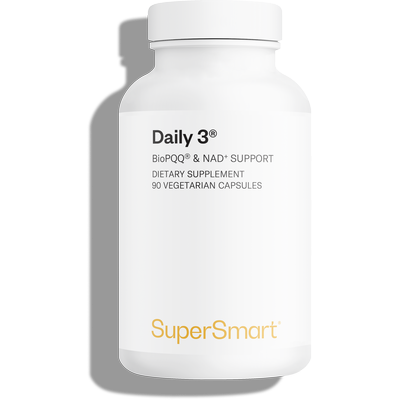Clinical study: do multivitamins slow cognitive decline?
Many scientists are looking to halt age-related cognitive decline. The COSMOS study looked at the impact of multivitamin and mineral supplementation on cognition. Find out more about the results of this large-scale study.

A large-scale study of the effects of multivitamins/multiminerals on cognitive function
Principle of the COSMOS multivitamin study
The COSMOS (COcoa Supplement and Multivitamin Outcomes Study) is a randomised, double-blind, placebo-controlled clinical trial involving 21,442 adults, published in March 2024 in The American Journal of Clinical Nutrition.
This large-scale study examines the effect of cocoa flavanol supplements and multivitamin supplements on several aspects of the health of older adults, including cardiovascular disease, cancer and cognitive function (1).
Within this vast COSMOS study, a meta-analysis combined the results of three sub-studies called COSMOS-Clinic, COSMOS-Mind and COSMOS-Web, which evaluated the effects of multivitamins on cognition.
Improved brain performance following multivitamin intake?
The COSMOS-Clinic sub-study was conducted on 573 people aged over 60.
It observed certain benefits in people taking a multivitamin supplement compared with those taking a placebo, in terms of overall cognition.
According to this sub-study, the difference proved to be particularly significant in terms of episodic memory, which refers to the ability to remember past events by linking them to their context.
The meta-analysis of the various sub-studies also showed clear evidence of these same benefits in the context of daily multivitamin and mineral supplementation over 2 years.
The tests carried out determined that the difference observed in overall cognition would be equivalent to a reduction in cognitive ageing of around 2 years.
The results of the COSMOS study therefore confirm the benefits of this type of supplementation in preventing cognitive decline in the elderly.
The benefits of vitamins and minerals for cognitive health
Vitamins and minerals are known to play an essential role in maintaining numerous physiological functions, including cognitive health (2).
More specifically, the nutrients that play a decisive role in cognitive function are:
- iodine and zinc, because they contribute to normal cognitive function;
- vitamins B1, B2, B3, B6, B12 and C, along with biotin, magnesium, potassium and iodine, because they contribute to the normal functioning of the nervous system;
- vitamin B5, which contributes to normal mental performance;
- vitamins B1, B3, B6, B9, B12 and C, along with biotin and magnesium, because they contribute to normal psychological function;
- vitamins B2, B3, B6 and C, as well as magnesium, because they help reduce fatigue; and
- vitamins B2, C and E, along with zinc and selenium, which help protect cells against oxidative stress.
Why take a multivitamin to combat cognitive decline?
Cognitive ageing, deficiencies and supplements
Age-related cognitive decline is the result of a number of factors, including oxidative stress, inflammation, reduced neurotransmitters, reduced cerebral blood flow, loss of synaptic plasticity, accumulation of toxic proteins, and so on.
Vitamins and minerals in the diet help to combat this phenomenon.
However, ageing is generally accompanied by a reduction in the intestinal absorption of nutrients, or even less effective cellular utilisation, which may require higher intakes of vitamins and minerals, particularly through supplementation.
The high vitamin and mineral intake provided by a quality food supplement (such as Daily 3®) helps to compensate for the deficiencies caused by ageing.
This helps to reduce oxidative stress, modulate inflammation, support cellular energy and protect neurons, thereby helping to preserve cognitive functions such as memory.
Other nutrients and compounds of interest for the brain
Some multivitamins may contain other nutrients of interest for brain health, in particular antioxidant compounds - in addition to vitamin B2, vitamin C, zinc and selenium, which are themselves antioxidants.
Examples of antioxidants include anthocyanidins in bilberry extract, proanthocyanidins in pine bark extract, polyphenols in green tea or grape seed extracts, oleuropein in olive extract, etc. (all these phytonutrients are found in Daily 3® multivitamin, in addition to the vitamins and minerals mentioned above) (3).
Some multivitamins even supplement this arsenal with valuable compounds such as:
- BioPQQ®, a qualitative form of pyrroloquinoline quinone, which is thought to act on mitochondrial biogenesis and protect neurons from oxidation;
- nicotinamide riboside, a precursor of NAD+, which supports cellular energy and neuroprotection; and
- quercetin, a general soothing agent believed to prevent cognitive decline. (Once again, they are all present in Daily 3®).
So, for more complete coverage of your needs, you should ideally turn to multivitamin formulas that include not only the targeted vitamins and minerals, but also antioxidant compounds and/or compounds of interest for cognition and general health (this is true of our flagship multivitamin Daily 3®, the most complete and highest dose on the market).
SUPERSMART ADVICE
References
- Vyas CM, Manson JE, Sesso HD, Cook NR, Rist PM, Weinberg A, Moorthy MV, Baker LD, Espeland MA, Yeung LK, Brickman AM, Okereke OI. Effect of multivitamin-mineral supplementation versus placebo on cognitive function: results from the clinic subcohort of the COcoa Supplement and Multivitamin Outcomes Study (COSMOS) randomized clinical trial and meta-analysis of 3 cognitive studies within COSMOS. Am J Clin Nutr. 2024 Mar;119(3):692-701. doi: 10.1016/j.ajcnut.2023.12.011. Epub 2024 Jan 18. PMID: 38244989; PMCID: PMC11103094.
- Rutjes AW, Denton DA, Di Nisio M, Chong LY, Abraham RP, Al-Assaf AS, Anderson JL, Malik MA, Vernooij RW, Martínez G, Tabet N, McCleery J. Vitamin and mineral supplementation for maintaining cognitive function in cognitively healthy people in mid and late life. Cochrane Database Syst Rev. 2018 Dec 17;12(12):CD011906. doi: 10.1002/14651858.CD011906.pub2. PMID: 30556597; PMCID: PMC6353240.
- Nazzi C, Avenanti A, Battaglia S. The Involvement of Antioxidants in Cognitive Decline and Neurodegeneration: Mens Sana in Corpore Sano. Antioxidants (Basel). 2024 Jun 7;13(6):701. doi: 10.3390/antiox13060701. PMID: 38929140; PMCID: PMC11200558.
Keywords
35 Days
Reliable delivery
Reliable delivery. Good product.
Viva
49 Days
Great service
Great service
cl
50 Days
Received product promptly and its early…
Received product promptly and its early days but seems to have improved my daughters alertness.
Anandi
61 Days
Amazing
Amazing, great product!
ALEX Sinclair
64 Days
Good products and Swift handling
Good products and Swift handling
Trusted
69 Days
I trust the company's product
I trust the company's products, the quality is trustworthy and the speed of delivery is also appreciated.
NAJIB Malaah
69 Days
Good job.
This company is serious when it comes to serving it's customers. They are fast to send out the orders. Their site is great and easy. Also, they treat their return customers with great deals and discounts. Keep up the good work.
ABDULQADER Jehad
70 Days
I know frech ( level 3 of 6) and can…
I know frech ( level 3 of 6) and can read your messages, but since order are official documents I'd like to have this in english. Merci Ursula Mathes
Ursula Mathes
74 Days
I worried the delivery.
Box was intact, content correct but delivery time was 12 days. I started to worry!
VIITANEN Esa
76 Days
Supply of Chondroitin 6-sulphate
The company has provided the required product efficiently with no complications.
OldBear
78 Days
Supersmart sell a lot of interesting…
Supersmart sell a lot of interesting stuff. More than jut the usual vitamins though they do all those as well. Ordering pretty straightforward - you may need to try a couple of times to get the offers to apply but they do work. I queried something and had a fairly quick sensible reply. Postage takes a couple if days but you do get good progress information. Very well packed. Bought from Supersmart a few times and will do so again.
AT Griffin
32 Days
Excellent
On m'a mis bien.
cliente
34 Days
qualité des produits et services
qualité des produits et services
denis riegel
36 Days
Nehme das Produkt noch zu kurz um eine…
Nehme das Produkt noch zu kurz um eine Bewertung abgeben zu können
Ermelinde
36 Days
Très satisfait
J'apprécie la facilité de navigation sur le site, le suivi des commandes, et bien sûr, la qualité des compléments alimentaires.
LE COUR SERGE




